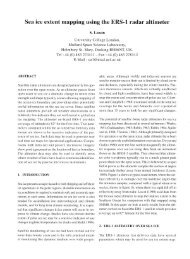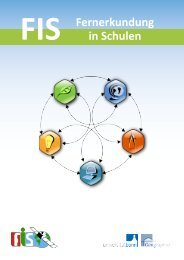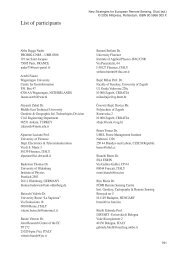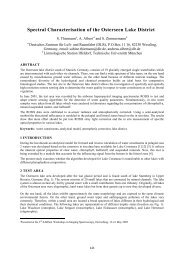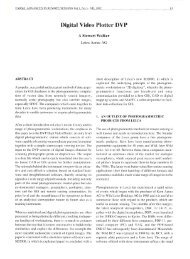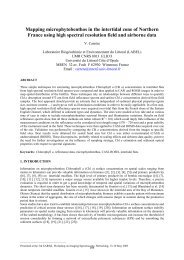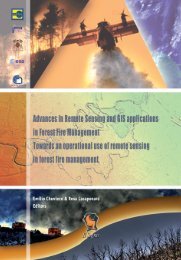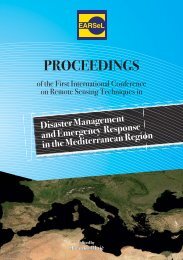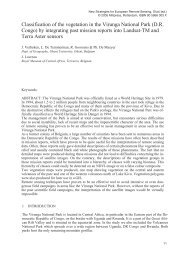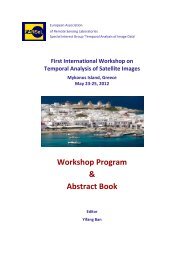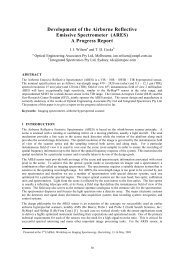EARSeL Newsletter - EARSeL, European Association of Remote ...
EARSeL Newsletter - EARSeL, European Association of Remote ...
EARSeL Newsletter - EARSeL, European Association of Remote ...
You also want an ePaper? Increase the reach of your titles
YUMPU automatically turns print PDFs into web optimized ePapers that Google loves.
<strong>EARSeL</strong> <strong>Newsletter</strong> September 2002 - Number 51<br />
12<br />
Commissioner Busquin said: "GMES is<br />
both a technological and an organisational<br />
challenge for Europe. It is a good example<br />
<strong>of</strong> how Europe, by working better together<br />
in research, can develop technologies that<br />
contribute to improving quality <strong>of</strong> life and<br />
meeting security needs. For instance,<br />
through GMES, we will support the implementation<br />
<strong>of</strong> the EU fisheries policy by<br />
better monitoring the evolution and migrations<br />
<strong>of</strong> fish stocks."<br />
Mr Rodotà recalled the dedicated efforts by<br />
ESA in the framework <strong>of</strong> GMES. ESA will<br />
start the implementation <strong>of</strong> operational services<br />
than can nowadays meet some priority<br />
users' requirements, based on current<br />
Earth observation (EO) capacities. The very<br />
concrete implementation <strong>of</strong> the GMES initiative<br />
is thus underway. Furthermore, ESA<br />
is now fully engaged with the <strong>European</strong><br />
Commission (EC) to discuss the most appropriate<br />
set-ups to insure the long-term<br />
sustainability <strong>of</strong> the GMES initiative.<br />
July's meeting was the first in a series that<br />
will foster the dialogue between decisionmakers<br />
and the many organisations involved<br />
in monitoring and in providing<br />
information for environmental and security<br />
purposes. The Forum will result in a report<br />
to be issued at the end <strong>of</strong> 2003, to<br />
provide policy-makers with recommendations<br />
for the steps ahead.<br />
GMES fosters Europe's ability to retrieve<br />
and process information obtained from<br />
space-borne and terrestrial observation<br />
systems with other geographical or socioeconomic<br />
data. It responds to growing concerns<br />
amongst policy-makers to ensure free<br />
and independent access to information on<br />
environment and security at global, regional<br />
and local level. GMES aims to support<br />
EU policies in areas such as sustainable development,<br />
global climate change and<br />
common foreign and security policy. At the<br />
global level, GMES will provide new verification<br />
tools to contribute to the precise<br />
monitoring <strong>of</strong> the implementation <strong>of</strong> international<br />
agreements, such as the Kyoto<br />
protocol on climate change, as well as security<br />
and international aid agreements.<br />
GMES will also help local authorities to<br />
pinpoint problems (e.g. shoreline erosion,<br />
environmental stress) and better react to<br />
catastrophic events (e.g. floods, mudslides,<br />
avalanches, and forest fires). At a<br />
<strong>European</strong> level GMES will provide new objective<br />
data to support a broad range <strong>of</strong> EU<br />
policies, including regional development,<br />
transport, agriculture, enlargement, development,<br />
and foreign policy.<br />
GMES is a key element <strong>of</strong> the <strong>European</strong><br />
Space Strategy developed by the EC and<br />
ESA. Along with the GALILEO global<br />
satellite navigation system, GMES will be a<br />
major pillar <strong>of</strong> the <strong>European</strong> Space Policy<br />
that is emerging from an ever-closer partnership<br />
between the two organisations. In<br />
November 2000, both the EU and ESA Ministerial<br />
Council endorsed GMES and identified<br />
it, along with GALILEO, as a top<br />
priority and test-case for the implementation<br />
<strong>of</strong> the <strong>European</strong> Strategy for Space.<br />
GMES was also presented in the EC’s Communication<br />
to the Gothenburg Council in<br />
June 2001, with a goal <strong>of</strong> creating the system<br />
by 2008. The idea was further developed<br />
in the Communication "Outline<br />
GMES EU Action Plan (Initial Period: 2001-<br />
2003)", which elaborates on the objectives,<br />
general implementation principles, organisation<br />
and first priorities.<br />
On the ESA side, GMES is at the core <strong>of</strong> a<br />
new five-year programmatic element (the<br />
"GMES Service element"), fully subscribed<br />
by the ESA Council at Ministerial level in<br />
November 2001. It will allow for the delivery<br />
<strong>of</strong> operational information, based on<br />
current EO capacities, for the thematic priorities<br />
already identified in the GMES<br />
framework. A first invitation to tender for<br />
those services will be released in September<br />
2002.<br />
GMES is also a key element <strong>of</strong> the "Aeronautics<br />
and Space" priority <strong>of</strong> the 6th EU<br />
Research Framework Programme (2002-<br />
2006), and will feature in the calls for proposals<br />
to be published at the end <strong>of</strong> 2002.<br />
The GMES initiative was also presented at<br />
the World Summit for Sustainable Development<br />
in Johannesburg, South Africa, in<br />
September 2002. For further information on<br />
<strong>European</strong> space policy and GMES, please<br />
visit:<br />
europa.eu.int/comm/space/index_en.<br />
html; www.esa.int; europa.eu.int/comm/<br />
research/press_en.html.



